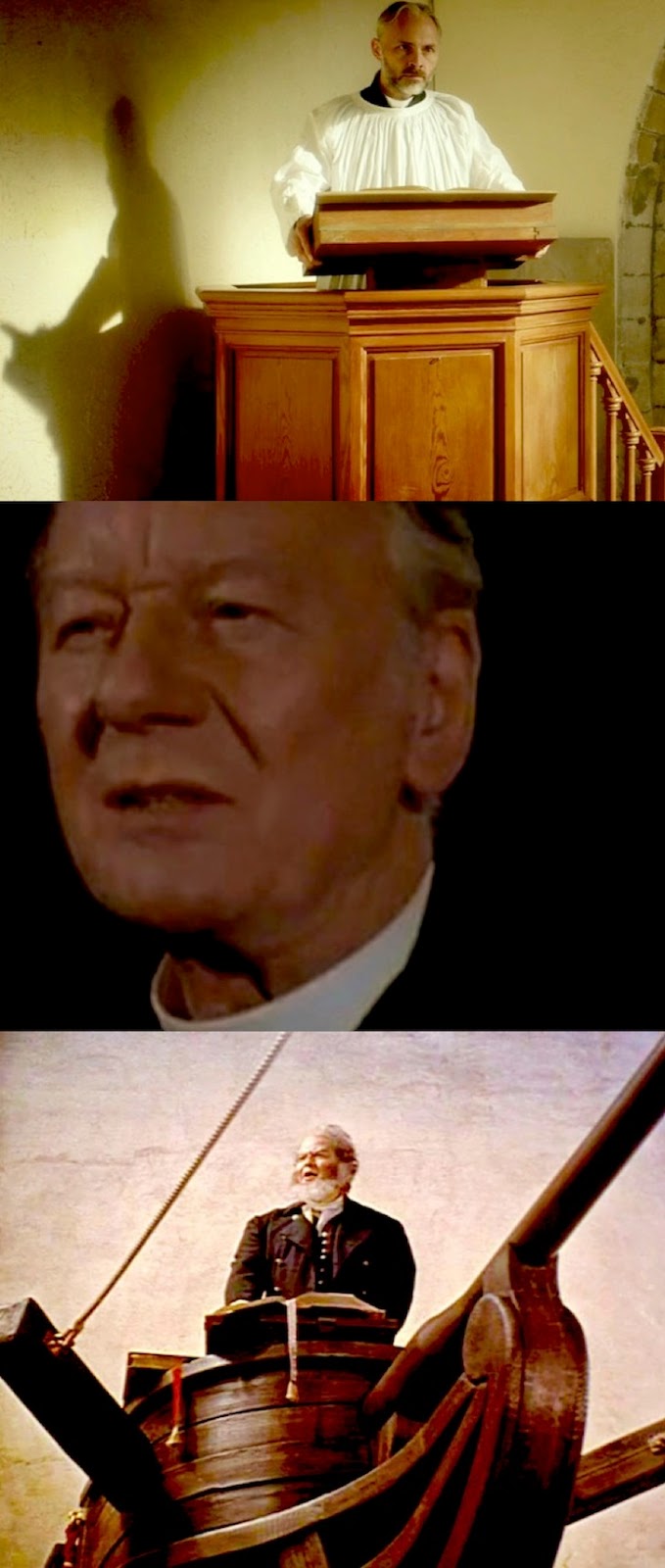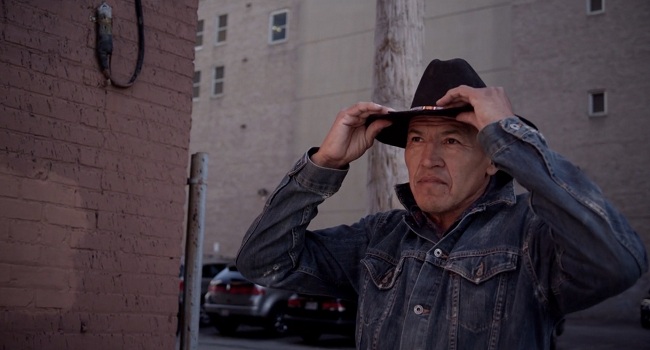Sunset Song (2015)
Dir. Terence Davies
Nvl. Lewis Grassic Gibbon
Starring: Agyness Deyn, Peter Mullan, Kevin Guthrie, Jack Greenlees, Daniela Nardini, Douglas Rankine, Ian Pirie, Linda Duncan McLaughlin, Mark Bonnar
Review By Greg Klymkiw
To my mind, Terence Davies is a National Treasure and easily the United Kingdom's greatest living director. Over the course of 30+ years, he's brought us eight feature length diamonds. Some have been exquisitely in the rough like 1983's The Terence Davies Trilogy of short films, the 1993 Southern Gothic of The Neon Bible and the shimmering 2008 Liverpool documentary Of Time and the City.
The carefully hewn diamonds are something else altogether - one picture after another to take their rightful place as cinematic equivalents to the priceless Persian Koh-I-Noor diamond. Blending painterly tableaux, to-die-for lighting, sweetly breathtaking camera moves (often slow and subtle), replete with Davies's virtually trademark recurring themes of time and memory, are, with few peers, amongst the best films of all time.
The masterpieces include 1988's Distant Voices, Still Lives, the gulp-and-tear-inducing exploration of a family seeking solace in "old songs" at the local pub to allay the constant physical, verbal and psychological assaults from a brutal patriarch, 1992's The Long Day Closes, a ravishing ode to movies in post-war Britain, 2000's The House of Mirth, the finest Edith Wharton film adaptation anyone will ever make, and 2011's The Deep Blue Sea, the finest film adaptation of any Terence Rattigan play that (you guessed it) anyone will ever make. (That said, Anthony Asquith's adaptation of The Browning Version with Michael Redgrave is a pubic-hair-close-second in the Rattigan movie sweepstakes.)
And now, a new masterpiece can be added to the pile.
Sunset Song is the ravishing, romantic story of a young woman who gives up her dreams of a higher education to care for farm and family. Her father is a brute who physically abuses his eldest son and demands constant sex from his wife, turning her into a breeding machine long after she is physically able to handle it. Upon the matriarch's death, Daddy Dearest gets a stroke and attempts to demand sexual favours from his only daughter. As she always has, she fights back against the unfairness and evil of patriarchy. Though her dreams of teacher's college were dashed, she discovers that her real dream consists of a deep love for the land, its people and the sweet-faced kindness offered by marrying a handsome, caring young man.
All seems well and then, war.
What's precious about her life is about to flip topsy turvy, but her strength, indomitable courage and intelligence will constantly be set upon the greatest of life's challenges. Davies charges this simple, yet complex tale with an astonishing mise en scène. Never has an on-screen courtship been sweeter and the love experienced by the young man and woman beats its heart constantly through joyous events, strife and hardships of the most devastating order and beyond.
We're faced with a myriad of life's moments with Davies's masterly direction: a deliriously romantic exchange amidst a sea of sheep, a glorious wedding sequence and barn dance, the cruelties of shell shock and the horrors of war.
There's a sequence in Sunset Song which is blessed with one of the most moving series of images and sounds that you're likely to see in any films - period. It's pure Terence Davies, yet also worthy of the very best of John Ford. The sequence is especially reminiscent of those stirring moments from Ford's screen adaptation of novelist Richard Llewellyn's How Green Was My Valley - a cornucopia of knockout moments wherein Welsh miners sing songs of sadness and joy at key points in Ford/Llewellyn's narrative of the land and its people.
Davies, of course, is not in Ford's Wales, but delivers his narrative of the land and people of Scotland in this heartbreaking, but ultimately moving and soaring film adaptation of Lewis Grassic Gibbon's immortal book "Sunset Song", the first in his important trilogy, "A Scots Quair".
As this is a Terence Davies film, music and song carry us to euphoric and elegiac heights. Using what might be the ultimate contemporary recording of Hugh Robertson's arrangement of Katherine Tynan's gut wrenching "All in the April Evening" (performed by The Glasgow Orpheus Choir), Davies and cinematographer Michael (Winter's Bone) McDonough's dazzling camera follow the people of the Estate of Kinraddie in Kincardineshire Mearns of northeastern Scotland as they slowly make their way over the rolling fields of yellow grasses until they converge upon the parish cathedral to prepare for a very solemn Sunday Service.
As beautiful and rich as the images are, along the country road and past the ancient rock buttressing the House of God, the camera, then dollying slowly backwards inside the cathedral as the townsfolk sit whilst sun streams through the majestic windows, waiting for the words of Reverend Gibbon (Mark Bonnar), there is a portent we cannot help but feel to our very core. It doesn't seem lost upon the townspeople either - what begins as a happy parade to worship, soon betrays visages of both melancholy and trepidation and the gait of the assembled, is ultimately not unlike a funeral march.
Tynan's song tells the tale of Christ's Passion, but given that Scotland has been corralled into war by England against The Hun, we cannot help but ascribe the meaning of the lyrics to reflect what really awaits the folk of Kinraddie:
The sheep with their little lambs
Pass'd me by on the road;
All in an April evening
I thought on the Lamb of God.
The lambs were weary, and crying
With a weak human cry;
I thought on the Lamb of God
Going meekly to die.
As the camera passes by the newly, happily married couple, Chris (Agyness Deyn) and Ewan (Kevin Guthrie), the lyrics are timed thusly:
. . . but for the lamb, The Lamb of God
Up on the hill-top green;
Here, Davies and McDonough reverse the angle upon the pulpit as the grim-faced Reverend slowly makes his way to the "holy" perch above the people. And the lyrics lament:
. . .Only a cross, a cross of shame
Two stark crosses between.
The Reverend ascends the stairs to his lectern of doom, lowers his head, then raises it, staring straight out at the congregation as the final lyrics hang in the air like a harbinger of death:
I saw the sheep with their lambs,
And thought on the Lamb of God.
The light then shines upon the suitably creepy Reverend as if it's been cranked-up by God Himself. Taking its place amongst such hellfire and brimstone cinematic sermons like John Gielgud in Joseph Strick's 1977 film of James Joyce's A Portrait of the Artist as a Young Man and Orson Welles in John Huston's film of Herman Melville's Moby Dick, Davies is blessed with the casting of Mark Bonnar to have us (and the congregation), quaking with horror.
With his brogue pitched to hysteria and meanness, Bonnar's rendering of the sermon seems to be the very core of the film (even though the picture is essentially a grand coming of age story). It goes thusly:
"As you know, we are now at war with Germany. This NEW BABYLON has as many corruption as the old one. How long it will rage is what God in His wisdom will only know. But it's a chastisement by blood and fire that the nations must arise and prevail against this enemy. And Scotland, not the least of these, in its ancient health and humility to tread again the path of peace and courage that will ultimately lead to our victory.
Their King, which they also call Kaiser, is the Antichrist - a foul evil upon this Earth that must be swept away by the righteous.
Those who will not fight to defend their country, must be exposed for that they truly are.
Cowards. And pro-German cowards at that."
History proves that the needs of the state are always bolstered by organized religion. Worse yet, World War I notoriously sacrificed the youngest and largest number of men from Scotland, Ireland and the colonies (including Canada, Australia, etc.) to ensure victory. Whole swaths of generational promise were sacrificed in this dirty war fought between the "ruling classes".
God forbid Davies should ever be politically obvious in a didactic fashion, but in so far as he chooses his material and presents it, he still exposes as many terrible truths about humanity as only the best filmmakers/artists do. Sunset Song is a love story, a coming-of-age story, but most of all, it serves as one of the most heartbreaking and potent antiwar films of the new millennium.
And here's my guarantee, you will shed copious tears.
THE FILM CORNER RATING: ***** 5-Stars
Sunset Song Opens in Canada via Unobstructed View:
May 13: Toronto, Cineplex Cinemas Varsity and VIP (55 Bloor St. W)
Toronto Holdover, Magic Lantern Carlton Cinemas
May 27: Vancouver, Vancity Theatre (1181 Seymour St.)
May 28: Winnipeg, Cinematheque (100 Arthur St.)
June 3: Calgary, Globe Cinema (617 8 Ave SW)
June 3: Waterloo, Princess Twin (46 King St. N)
June 17: Montréal, Cinéma du Parc (3575, av. du Parc)
Cinéma Beaubien (2396, rue Beaubien Est)
June 17: Ottawa, ByTowne Cinema (325 Rideau St.)
June 17: Québec City, Cinéma Le Clap (2360, chemin Sainte-Foy)
June 17: Cobourg, The Loft Cinema (201 Division St.)











































